Recently, Prime Minister David Cameron announced an initiative to ban “extreme pornography,” starting by installing mandatory porn filters on all new internet connections and, eventually, on existing connections as well. To view internet pornography, UK residents will have to call their ISP and ask access. Opponents of Cameron’s restrictions have argued that the alleged motive to protect children from viewing pornography impedes vastly on the individual rights of consenting adults. Now, they have something else to worry about.
The filtering system being promoted by Cameron is run by a Chinese company called Huawei, which has close ties to the Chinese government. It has often been accused of spying for the Chinese government and US intelligence committees have declared Huawei a threat to national security.
“The alleged links between Huawei and the Chinese State are concerning, as they generate suspicion as to whether Huawei’s intentions are strictly commercial or are more political,” UK officials have said. They then went on to say that they hadn’t found any evidence of wrongdoing. Huawei has denied having close ties with the Chinese government and said it should not be thought of as suspicious just because it’s a Chinese company. Hey, China takes blocking internet porn seriously. China takes all of its internet blocking seriously.
Huawei itself isn’t the only problem for some critics. The whole notion of the internet filtering system being ran by a private company is troubling.
“It needs to be run by an organization accountable to a minister so it can be challenged in Parliament,” says Dr Martyn Thomas, chair of the IT policy panel at the Institution of Engineering and Technology. “There’s certainly a concern about the process of how a web address gets added to a blacklist — who knows about it, and who has an opportunity to appeal against it… You could easily imagine a commercial organization finding itself on that blacklist wrongly, and where they actually lost a lot of web traffic completely silently and suffered commercial damage. The issue is who gets to choose who’s on that blocking list, and what accountability do they have?”
David Cameron said that the actions of ISPs would be closely monitored to ensure fair play.


